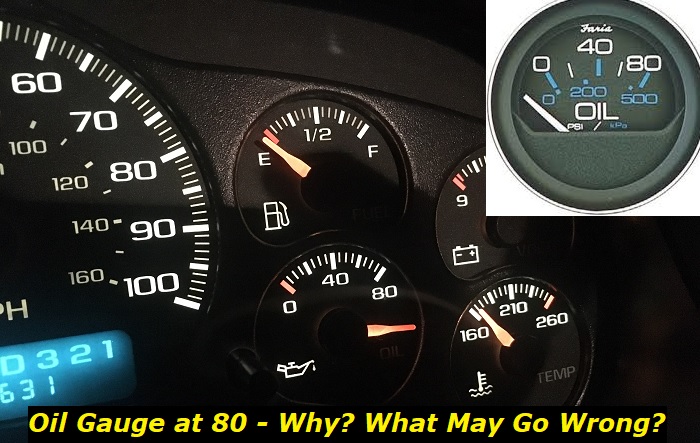Modern cars contain a slew of sensors and gauges that need to be monitored to maintain good driving conditions. The oil gauge is an important gauge to watch. The ideal oil pressure for a car varies depending on the make and model, but most cars operate well within a range of 25-60 PSI. The dangers of low oil pressure are well known, but what about high oil pressure? What does it mean when your oil gauge is at 80, and why is it dangerous?
Engine electronics problems highlights
- Level of urgency:Medium
- DIY inspection:Very complicated
- DIY repair:Impossible
- Cost of repair:$250 - $450
- Can you drive?Usually, yes
- Commonreasons:Electronic control modules failure, electrical contacts problems, wiring issues, software problems
- Ways to fix:Usually, professional inspection and repair needed only

What is Oil Pressure?
Before we can discuss what it means when your oil pressure is above 80, it is important to understand what oil pressure is, and what it means for the engine. Oil pressure is the pushing force on the oil generated by the oil pump forcing the oil through the narrow bores and passages in the engine. As the oil squeezes through these passages, it is pressurized, allowing it to move further throughout the engine to lubricate its moving parts.
Sufficient oil pressure is important because it forms a cushion between the engine's moving parts, protecting their surfaces from wear. Sufficient oil pressure also ensures good oil flow, which allows the engine oil to carry excess heat away from surfaces in contact to protect them from overheating and warping.
What's Wrong with High Oil Pressure?
After understanding the importance of oil pressure, it might seem like the higher the pressure, the better. However, high oil pressure is usually a sign that something is wrong with the engine. If the oil pressure remains high for too long, it can also cause further issues to develop in the engine, including engine damage.
The most immediate risk of high oil pressure is engine damage. High oil pressure usually indicates that there is a blockage somewhere in the oil passages. This blockage causes oil pressure to build up in some parts of the engine, while other parts are completely starved of oil.
If this occurs when the engine is under load, the effects can be felt almost immediately. Some parts of the engine don't manage well without engine oil for long, and will quickly overheat, warp, or break down. This means that high oil pressure can result in engine damage in very little time.
Another risk associated with high oil pressure is an oil filter explosion. If the high oil pressure is caused by a stuck or faulty relief valve, the pressure in the engine can build up so high that the oil filter blows apart. This will lead to an instant loss of oil and a drop in oil pressure.
Preventing engine damage from high oil pressure will require you to stop driving as soon as you notice it, and work on getting the issue resolved.
What Causes High Oil Pressure?
High oil pressure has a few different causes. Knowing the cause of your high oil pressure issue is the first step to fixing it and getting your car back in safe driving condition.
Here are some problems your car might have that will put your oil gauge above 80.
1) Dirty Oil Filter
The oil filter protects your engine by filtering out dirt and contaminants from the engine oil. Eventually, dirt will build up on the oil filter, and it will need to be replaced. This is typically part of regular car maintenance. If the oil filter isn't replaced on time, the filter could become so dirty that it is eventually clogged and blocked completely.
A blocked oil filter will hinder oil flow and cause the oil pressure to rise. It will also prevent oil from reaching parts of the engine, causing oil starvation and risking serious engine damage.
What to Do About This?
You can examine your oil filter to find out if it is dirty or not. A very dirty oil filter will need to be replaced to restore unimpeded oil flow to the engine.
2) Blocked Bores and Passages
When oil flows through the engine, it moves through a series of passages. If these passages are blocked by dirt or debris, the oil pressure will climb, and the risk of engine damage increases.
Blocked passages are usually caused by dirt from dirty engine oil. A damaged oil filter will allow dirt and debris to get into the engine where it can cause blockages.
What to Do About This?
Clearing out the blockage on your own isn't recommended. It's hard to find the source of the blockage, and attempting to fix the issue on your own could make it worse.
You should get the help of an experienced mechanic to locate and clear the blockage, if possible. Certain sensitive components will need to be replaced if they are blocked.
You should also check your oil filter for damage or tears and replace it if necessary.
3) Malfunctioning Relief Valve
The pressure relief valve is a safety mechanism built into the car that gives the oil a place to flow when the oil pressure gets too high. This removes some oil from the system and allows the oil pressure to return to a safe level.
If the relief valve fails to open, the oil pressure in the engine can climb to dangerous levels very quickly. Relief valves don't fail often, but when they do, they have serious effects on the health of the engine.
What to Do About This?
It is difficult to test the oil pressure relief valve directly. The simplest way to check whether the valve is working is to remove the relief valve and clean it. After cleaning the valve, reinstall it into the car and run the engine again. If the pressure stays below 80, then the problem was from the valve.
If the oil pressure stays above 80 after cleaning the valve, then the problem is coming from somewhere else in the car.
4) Wrong Oil Type or Poor Oil Quality
Using the wrong type of oil can have a serious impact on your engine. Engine oil comes in different grades with different properties. An important oil property to consider is viscosity. Viscous oil is thicker and more difficult to push through the engine, while less viscous oil flows more easily.
If your engine requires low-viscosity oil, then using high-viscosity oil can cause high oil pressure.
Using the wrong type of oil can cause different problems in your car apart from high oil pressure, so it is important to watch out for this.
What to Do About This?
Make sure to check your vehicle's owner's manual to find out the proper type of oil for your engine. Using the correct oil type will save you from a lot of engine trouble later on.
If your engine has already been filled with the wrong type of engine oil, you will need to replace the engine oil with the appropriate type.
If you have noticed any other irregular signs from your car, like strange sounds, the smell of burning oil, or oil leaks, then your car might have experienced other damage from using the wrong oil. You should have the car examined by a mechanic to identify any other problems with the car.
What's Wrong with Low Oil Pressure?
While it is important to keep your oil pressure below 80, it is also crucial that you maintain your oil pressure above a certain limit too. Low oil pressure results in starvation throughout the engine, which can result in widespread engine damage or total engine failure very quickly.
The optimum oil pressure range for most cars is between 25-60 PSI. However, you should check your owner's manual to be sure of the oil pressure requirements for your vehicle.
Conclusion
When your oil gauge is above 80, it indicates that your oil pressure is higher than normal. High oil pressure leads to many different problems in an engine and needs to be addressed as soon as possible.
High oil pressure usually means that there is a blockage impeding the engine's oil flow, which can result in oil starvation and engine damage. When high oil pressure is caused by a faulty relief valve, the oil pressure can build up high enough to cause the oil filter to explode.
High oil pressure values are usually caused by a stuck relief valve or a dirty oil filter. In more serious cases the issue can be caused by blockages in the passages of the engine, or by using the wrong grade of oil.
About the authors
The CarAraC research team is composed of seasoned auto mechanics and automotive industry professionals, including individuals with advanced degrees and certifications in their field. Our team members boast prestigious credentials, reflecting their extensive knowledge and skills. These qualifications include: IMI: Institute of the Motor Industry, ASE-Certified Master Automobile Technicians; Coventry University, Graduate of MA in Automotive Journalism; Politecnico di Torino, Italy, MS Automotive Engineering; Ss. Cyril and Methodius University in Skopje, Mechanical University in Skopje; TOC Automotive College; DHA Suffa University, Department of Mechanical Engineering






Add comment